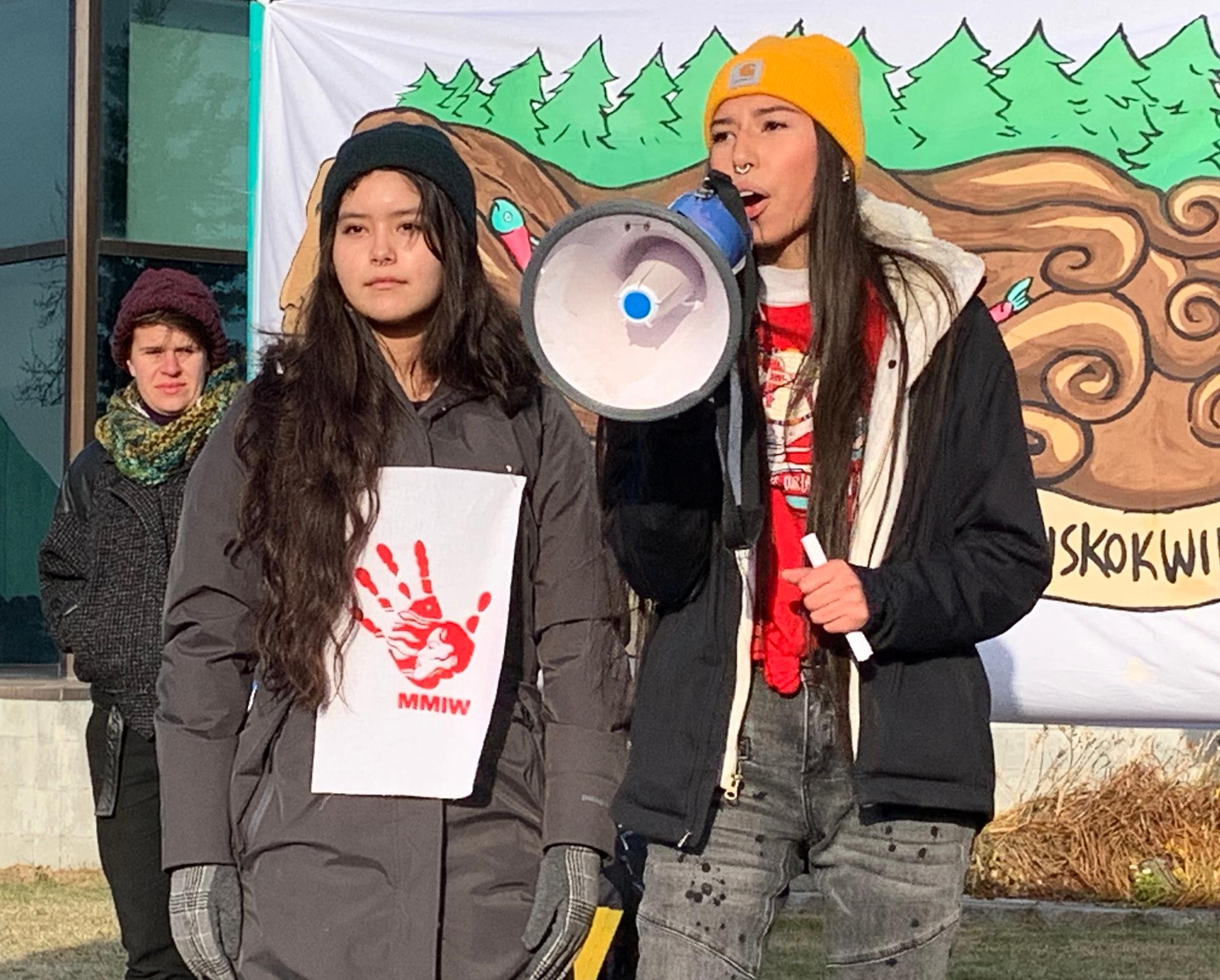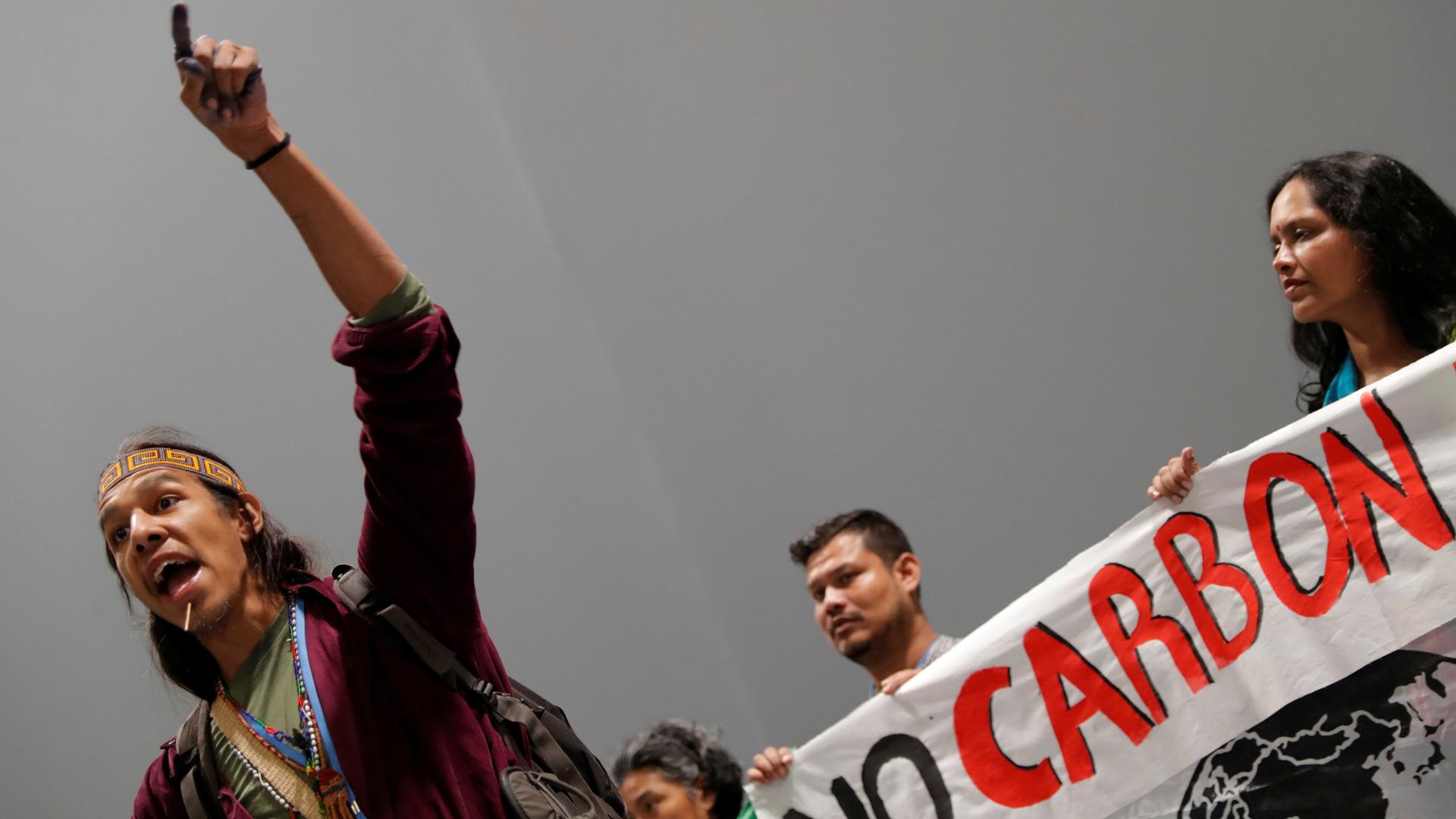Indigenous youth take global stage in Madrid to voice climate change worries
An activist speaks at a protest about the destruction brought by carbon markets and carbon offsets at the venue of the UN climate change conference (COP25) in Madrid, Spain, Dec.5, 2019.
A worldwide climate change movement is well underway, highlighted by strikes, protests and school walkouts increasingly led by young people. And this week in Spain, that message is being delivered by a diverse group of young, Indigenous people from around the globe to the United Nations.
Related: 4 things to watch at the climate talks in Madrid
“We’re realizing that our leadership … is not taking the mandatory steps to save our future and [we have] to step into that position …”

“We’re realizing that our leadership … is not taking the mandatory steps to save our future and [we have] to step into that position …” said 15-year-old Nanieezh Peter, during the convention of the Alaska Federation of Natives back in October.
Peter and her best friend, Quannah Chasing Horse Potts, 17, both Alaksa Native, successfully convinced their leaders to declare a climate change emergency in Alaska, the northernmost state in the US. Their request for the emergency declaration on the debate floor in a hockey arena in Fairbanks, Alaska, sparked a fervent and hours-long debate during the annual convention.
Related: Without respect for Indigenous rights, climate change will worsen
Indigenous youth voices have historically been silenced in the fight against climate change. For many decades, if not centuries, Indigenous people in Alaska, Canada and elsewhere were forced to abandon their cultural heritage, traditions and in some cases, their homelands. Those who spoke out were often punished. But now, their grandchildren are finding a voice.
Related: With Indigenous perspective, Anchorage adapts to climate change
This week, they’ve delivered a collective message to UN leadership: Take meaningful action on climate change.
On Thursday, Dec. 5, the Indigenous Climate Action Youth Delegation sent a letter to Canada’s Minister of Environment and Climate Change, Johnathan Wilkinson. The delegation is concerned that the international agreement on greenhouse gas mitigation, the Paris agreement, is “disproportionately focused on market-based climate solutions.” They wrote carbon-based markets “further enable the colonial legacy of dispossession, privatization, violence against Indigenous women and girls and destruction of Indigenous lands and culture for fossil fuel extraction.”
“Young people in this period of history, they’re no longer afraid to speak up, they’re no longer afraid of policy, they’re no longer afraid of the government, they’re no longer afraid of speaking their mind …”
Ben Charles, who is also Alaska Native, and recently named an emerging leader by the Inuit Circumpolar Council, said, “Young people in this period of history, they’re no longer afraid to speak up, they’re no longer afraid of policy, they’re no longer afraid of the government, they’re no longer afraid of speaking their mind …” The international organization represents more than 180,000 Indigenous people in four Arctic nations.
Potts’ and Peter’s advocacy last fall “is a single milestone of many that are progressing the Indigenous people’s traditional knowledge on the world stage,” Charles said. While Potts and Peter are not at the UN Climate Change Summit in Madrid, Charles will be there to help Indigenous youth develop climate action statements. He’s also taking part in panel sessions that help improve understanding of Inuit initiatives.
Inuit aren’t the only Indigenous people represented at the meeting. Representatives of the Rapa Nui and Mapuche Indigenous Peoples of Chile are also in Spain for the meeting. SustainUS, an American nonprofit, has sent its first-ever delegation of Indigenous young people to Madrid. In New Zealand, a group of young adults who are indigenous to the region spent at least a month fundraising to cover their travel expenses to the UN Climate Summit. And on Friday, a group of First Nations kids will premiere a documentary film they produced about their first-hand climate change experience in northern Canada.
Elevating Indigenous youth voices sometimes comes with controversy, however. Back in October, Potts’ and Peter’s calls for action in Alaska were met with opposition from leaders like Crawford Patkotak, from Utqiagvik, Alaska’s northernmost city. Patkotak holds several leadership positions for the Arctic Slope Regional Corporation, which has a financial responsibility to its Native shareholders.
Patkotak and others worried that the young women had been influenced by an environmental movement and hadn’t considered what regulations could mean for their community.
“We gotta have the right balance, not only to enhance, protect and live our culture, but prevent unnecessary regulation that would tie our hands up when it comes to developing our own resources.”
“We gotta have the right balance, not only to enhance, protect and live our culture, but prevent unnecessary regulation that would tie our hands up when it comes to developing our own resources,” Patkotak said.
His corporation pays shares at least in part from natural resource development revenue. He voiced concern that declaring an emergency could translate into regulations that might further limit resource development — the kind of activity that fuels economic opportunity in communities like his, where jobs are scarce.
“I am not an environmentalist,” Potts shot back from the debate floor in October. “I am Indigenous and we are not here to fight with our own people. We are here to stand together,” she said.
Standing next to her best friend on the floor of an arena normally used for hockey games and roller derby competitions, Peter added that their goal was to protect Indigenous rights and culture for future generations. “[A]nd economic growth and money is not a part of that conversation,” said Peter, through gritted teeth.
“It’s really walking two worlds and knowing that the two worlds that we’re walking go hand-in-hand. … We don’t want to go back to the old ways, but we want to incorporate modern living and modern amenities with regards to the core principles and foundations of being Indigenous.”
This generational and ideological difference between elders and youth is one Ben Charles hopes to bridge. “It’s really walking two worlds and knowing that the two worlds that we’re walking go hand-in-hand,” he said. “We don’t want to go back to the old ways, but we want to incorporate modern living and modern amenities with regards to the core principles and foundations of being Indigenous,” he said.
Back in Alaska, Potts and Peter said they want their emergency declaration to set off a “chain reaction” where Indigenous people collectively and across generations decide how to move forward on climate change.
